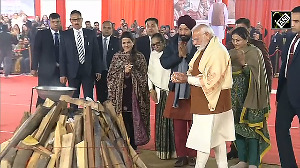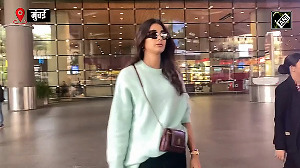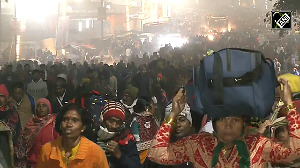The Indian Muslims must get out of the syndrome of victimhood and persecution and do some self introspection. They must change their attitude towards national issues and political parties. The media can only mirror a reality, it cannot change it, says Shahid Siddiqui.
What happened in Mumbai's Azad Maidan was symptomatic of a much larger problem both with the media and Muslims. The media generally is today looked down upon with suspicion and doubt.
Muslims generally have a long standing love hate relationship with the media. They want the media to highlight their grievances and sufferings at the same time they are angry with the national media for sensationalising anything to do with Islam or Muslims. What happened at Azad Maidan is not something new.
The media has been at the receiving end of a crowd's irrational emotional anger; however it was for the first time that a Muslim crowd attacked and burned media vans. It is necessary for all of us specially the media to understand why a section of Muslims behaved this way and why Muslims in general are critical of the role of media specially the electronic media. Media being the most powerful organ of the political system has to respond to the grievances of the people even if they are misplaced.
Media, the enemy
A section of the Muslims has held onto the belief that national media is largely prejudiced against them. It paints them in a bad light and highlights their faults. The crime committed by an individual of the community is projected onto the entire community in the media and every Muslim is made accountable and answerable for the actions of an individual. This perception about the media is present in the minds of even highly secular and liberal Muslims I have met and spoken to.
As always this is only a partial truth which a community suffering from a sense of insecurity and discrimination for a long time easily believes in. It is important that we learn from the violent incident of Mumbai and try to analyze and dissect various aspects of this belief.
The role of the media
The truth is that national media whether print or electronic has played an instrumental role in highlighting the atrocities committed against the minorities, especially the Muslims. From the Meerut /Hashimpura riots back in the 1980s to the Bhagalpur riots and more recently Gujarat, it is the national media which has brought out the truth through its rigorous investigative journalism and exposed those responsible for committing communal atrocities.
All this has not been accomplished without any risks. I have myself seen young men and women putting their lives at risk in order to bring us closer to the truth in extremely harsh and difficult circumstances with limited resources at their disposal. The Indian media, both vernacular and English, print and visual have in their own way tried to bring out the stories of struggle and injustice faced by the minorities, particularly Indian Muslims.
It is the media which has repeatedly taken the government to task for not fulfilling its secular duties. If it were not for the media, then the atrocities committed in Gujarat in 2002 would have been conveniently forgotten as was the case in 1983 in Nellie massacre in Assam or 1993 riots in Mumbai. The national media despite all its own limitations, perversions, biases and shortcomings has tried to play the role of a successful communicator.
Muslims and the relationship with the media
The relationship between the Muslims and the Indian media has always been complicated. The negative perception of Indian Muslims towards the media has been partly fueled by a sense of victimhood and persecution, propagated largely by the vote loving 'pseudo-secular' parties. Of course, we cannot give a clean chit to the media.
There are elements in the media that give a negative twist to the coverage of events and happenings related to Indian Muslims. Attempts have been made by the media to project Muslims as a monolithic block and downplay the various economic, cultural and regional differences.
Today, some sections of the Indian Muslims are asking why the killings in Assam were not given the same weight age the way Gujarat riots were. Is there a conscious effort to play down the violence in Assam? The feeling is that the media seems to be more preoccupied and concerned about covering the plight of people of the northeast who left the cities of Bangalore and Pune, largely due rumour mills and some genuine concerns about their safety. The same media does not seem to be highlighting the plight of the thousands of Muslims who without any proof are being tarnished as Bangladeshis?
There is some truth in the allegations but the reality is that the media which had all the resources at its disposal while covering the riots in Ahmadabad and other parts of Gujarat, does not have the same kind of resources and personnel to do an honest job in the relatively remote areas of Kokrajhar and the Bodo tribal belt.
Still, a large section of the media, both electronic and print has been trying to bring out both sides of the story but the problem is that the people only want partial truth to be made palatable for their own consumption.
The media is playing an extremely important and delicate role of communicator in a fragile and fragmented social and cultural environment. Those media anchors and media personalities, who believe in a knee jerk reaction and express their views and opinion at the drop of a hat, have to understand that few words and negative ideas can play havoc with the minds of the people.
The Indian media has often been accused of oversimplifying and sensationalising reality. The concept of news as entertainment where images of misery and suffering are directly brought to our drawing rooms and news is consumed by the people as passive 'spectators' often loses its objectivity and fact based orientation.
Blaming the media is not the only answer
The electronic and print media are doing a great job but there is a conscious need to bridge the gap between the perception of Muslims and the media. A concerted effort needs to be made so that Muslims believe that media is their friend, not their enemy.
The educated Muslims have always lamented the fact that they don't have an English newspaper of their own or a channel to voice their views on their social and economic issues. They must realise that having a media platform in the form of a newspaper and news channel is not the only answer to their problems.
The Indian Muslims must get out of the syndrome of victimhood and persecution and do some self introspection. They must change their attitude towards national issues and political parties. The media can only mirror a reality, it cannot change it. It can only act as a vehicle for dissemination of information but the relations between various communities will depend on their own enlightened leadership.
Shahid Siddiqui is the founder editor of Nai Duniya and a former MP.







 © 2025
© 2025